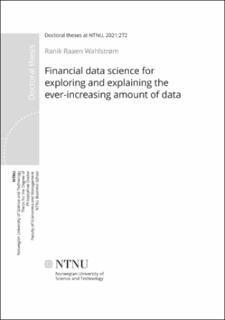| dc.contributor.advisor | Paraschiv, Florentina | |
| dc.contributor.advisor | Füss, Roland | |
| dc.contributor.author | Wahlstrøm, Ranik Raaen | |
| dc.date.accessioned | 2021-08-31T13:02:24Z | |
| dc.date.available | 2021-08-31T13:02:24Z | |
| dc.date.issued | 2021 | |
| dc.identifier.isbn | 978-82-326-6261-6 | |
| dc.identifier.issn | 2703-8084 | |
| dc.identifier.uri | https://hdl.handle.net/11250/2772003 | |
| dc.description.abstract | Summary
This thesis contributes to data-driven financial studies by arguing for two potential improvements of financial data science over pure financial econometrics. First, this thesis argues for letting a data-driven process guide the selection of model variables in cases of data sets with many observations or many competing variables available. This is addressed in Articles 2 and 3 in this thesis, in applications to corporate finance with focus on company bankruptcy prediction. Second, this thesis argues for evaluating models not solely based on goodness of fit criteria and standard statistical metrics, but also on the real economic implications of their predictions and the stability of their estimated parameter values when these have an economic interpretation. Articles 1 and 3 of this thesis address this in applications to yield curve modeling and company bankruptcy prediction, respectively.
For central banks, this thesis makes recommendations on relevant modeling and data choices when fitting parsimonious yield curve models for monetary policy decisions. The recommendations have a particular emphasis on the stability of parameter estimates over time, as these have an intrinsic economic meaning. Further, this thesis shows that feature selection methods improve bankruptcy prediction models commonly used by banks and financial regulators. Moreover, it proposes an improved bankruptcy prediction model for small and medium-sized enterprises (SMEs) compared to the benchmark model employed by the Financial Supervisory Authority of Norway. Finally, this thesis documents evidence concerning the benefits of aligning national accounting standards towards IFRS (International Financial Reporting Standards). | en_US |
| dc.description.abstract | Sammendrag
Denne avhandlingen gir et bidrag til datadrevne økonomiske studier ved å argumentere for to mulige forbedringer ved bruk av finansiell datavitenskap fremfor ren finansiell økonometri. For det første argumenterer denne avhandlingen for å benytte en datadrevet prosess ved valg av modellvariabler i tilfeller med mange observasjoner eller mange konkurrerende tilgjengelige variabler. Dette behandles i artikkel 2 og 3 av avhandlingen ved hjelp av praktiske anvendelser av modeller for predikering av selskapers konkurs. For det andre argumenterer denne avhandlingen for å evaluere modeller basert på de virkelige økonomiske implikasjonene av deres prediksjoner og basert på stabiliteten til deres estimerte parameterverdier når disse har en økonomisk tolkning. Dette er et bidrag til eksisterende litteratur siden denne vanligvis evaluerer modeller kun basert på hvor godt de passer data eller basert på standardiserte statistiske målekriterier. Artikkel 1 og 3 i denne avhandlingen behandler dette ved hjelp av praktiske anvendelser innenfor henholdsvis modellering av avkastningskurver og predikering av selskapers konkurs.
For sentralbanker gir denne avhandlingen anbefalinger om relevante modelleringsvalg og datavalg ved tilpassing av modeller for avkastningskurver til bruk ved pengepolitiske beslutninger. Anbefalingene har særlig vekt på stabiliteten til estimater av modellers parametere over tid, ettersom disse har en økonomisk tolkning. Videre viser denne avhandlingen at datadrevne metoder for valg av variabler forbedrer modeller som benyttes av banker og finanstilsyn for predikering av selskapers konkurs. I tillegg foreslår avhandlingen en forbedret modell for predikering av konkurs hos små og mellomstore bedrifter (SMB) sammenlignet med den som benyttes av Norges Bank og Finanstilsynet. Til slutt dokumenterer denne avhandlingen fordelene ved å tilpasse nasjonale regnskapsstandarder til IFRS (International Financial Reporting Standards). | en_US |
| dc.language.iso | eng | en_US |
| dc.publisher | NTNU | en_US |
| dc.relation.ispartofseries | Doctoral theses at NTNU;2021:272 | |
| dc.relation.haspart | Paper 1: Wahlstrøm, Ranik Raaen; Paraschiv, Florentina; Schürle, Michael. A comparative analysis of parsimonious yield curve models with focus on the Nelson-Siegel, Svensson and Bliss versions. Computational Economics 2021 https://doi.org/10.1007/s10614-021-10113-w This article is licensed under a Creative Commons Attribution 4.0 International License (CC BY 4.0) | en_US |
| dc.relation.haspart | Paper 2: Kainth, Akarsh; Wahlstrøm, Ranik Raaen. Do IFRS promote transparency? Evidence from the bankruptcy prediction of privately held Swedish and Norwegian companies. Journal of Risk and Financial Management 2021 ;Volum 14.(3) https://doi.org/10.3390/jrfm14030123 This is an open access article distributed under the Creative Commons Attribution (CC BY) License which permits unrestricted use, distribution, and reproduction in any medium, provided the original work is properly cited. | en_US |
| dc.relation.haspart | Paper 3: Paraschiv, F., Schmid, M., Wahlstrøm, R.R., 2021. Bankruptcy Prediction of Privately Held SMEs Using Feature Selection Methods. | en_US |
| dc.title | Financial data science for exploring and explaining the ever-increasing amount of data | en_US |
| dc.type | Doctoral thesis | en_US |
| dc.subject.nsi | VDP::Social science: 200::Economics: 210 | en_US |

